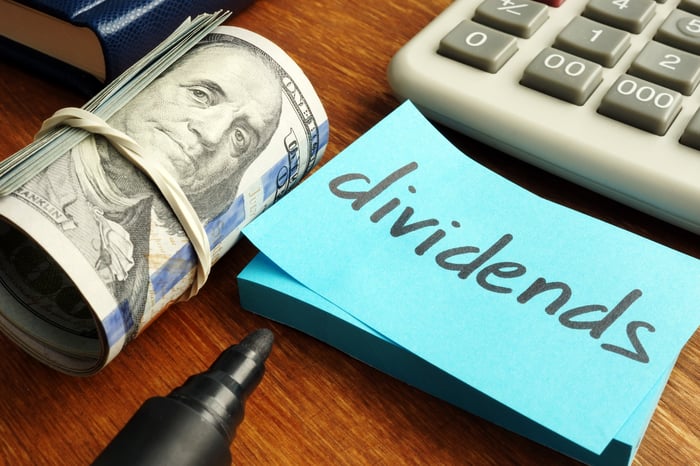When investors think about high yield stocks the yield is often the only issue considered. That's a mistake because sometimes high yields are a sign of a risky dividend. That's why you should also examine the company backing the yield and, equally important, its commitment to supporting the dividend through good markets and bad ones. Right now dividend investors should probably be considering reliable income stocks like Enterprise Products Partners (EPD 1.17%) and United Parcel Service (UPS 0.43%). Here's why.
Enterprise is boring in a good way
Enterprise Products Partners is a master limited partnership (MLP) that operates in the midstream segment of the oil and natural gas industry. It owns vital infrastructure assets like pipelines, storage, processing, and transportation facilities. While oil and natural gas companies are often volatile, Enterprise is basically just a toll taker, charging customers fees for the use of its assets. Given the importance of oil and natural gas to the world's economy, demand for Enterprise's assets tends to be fairly strong in both good energy markets and bad ones.

Image source: Getty Images.
Simply put, Enterprise's cash flows tend to be fairly robust no matter what is going on with oil prices. That's how the MLP has managed to increase its distribution every year for 26 consecutive years despite operating in the often volatile energy sector. Add in an investment grade rated balance sheet and distributable cash flow that covers the distribution by a strong 1.7 times and you get a very reliable income stock.
That said, it is important for investors to understand that growth opportunities in the midstream space are fairly limited. Enterprise's attractive 6.6% yield will likely make up the vast majority of your return. Still, Enterprise is one of the largest midstream players in North America, so a modest capital investment budget will likely be augmented by acquisitions along the way. Distribution growth of around low to mid single digits is probably a reasonable expectation over time. That's not a bad combination if you are a dividend investor looking to maximize the income stream your portfolio generates.
NYSE: EPD
Key Data Points
UPS has more of a dividend growth flare
Slow and steady growth with a high yield is what you get from Enterprise. United Parcel Service is a bit different, offering higher dividend growth but a lower yield. To put a number on that, UPS, as the company is more commonly known, increased its dividend at a compound annual rate of nearly 10% over the past decade. That's two to three times faster than the historical growth rate of inflation, so this package delivery service has materially grown the buying power of its dividend over time.
What's really exciting about UPS today, however, is that its 4.8% yield is near the high end of the stock's historical yield range. That suggests that the company is on sale right now. There's a reason for that, given that the business isn't hitting on all cylinders. However, the third quarter of 2024 saw year over year improvements in revenues and operating margin, so the company is working to get back on track and, seemingly, succeeding. There's still more work to be done, but management looks like it has the business heading in the direction.
NYSE: UPS
Key Data Points
That said, the real attraction here is the business. UPS is one of a small number of very large package delivery companies. It would be difficult, if not impossible, to replicate what UPS offers. And given that online shopping continues to grow, it seems highly likely that more demand is on the horizon. If you can handle owning a turnaround situation, UPS looks like a dividend growth stock fallen angel that's already starting to earn back its wings.
Two solid dividend options for you cash in on right now
If you have $500, $5,000, or even $5 million and you like dividend stocks, you'll want to check out Enterprise and UPS. One is going to be a better option for investors looking to own high-yield fare while the other will probably attract those looking for dividend growth. But both businesses have very attractive features and yields that you should be able to count on for years to come.




